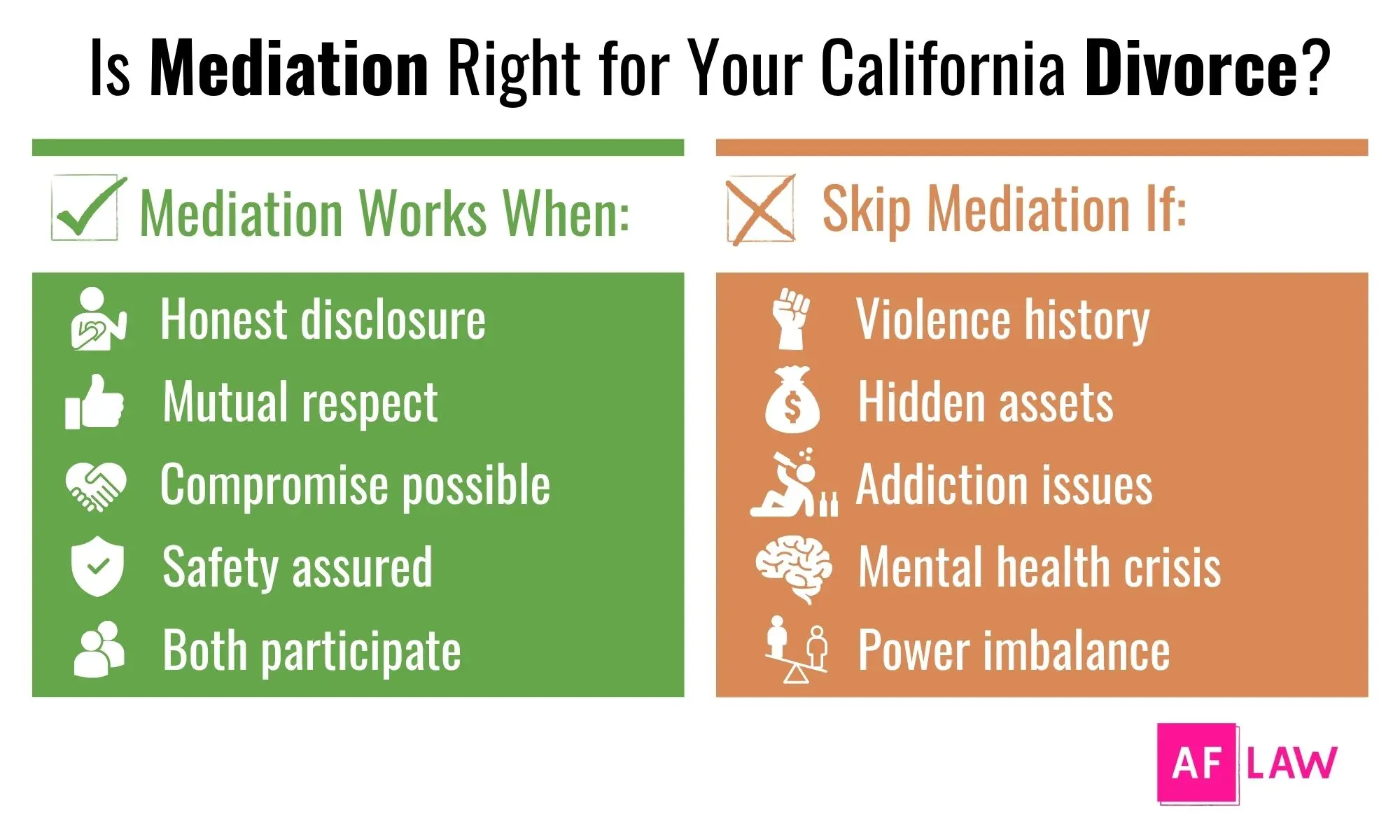Divorce mediation in California resolves about 70% to 80% of cases, depending on the study, often at half the cost of litigation. After 14 years of practicing family law across Sacramento, Yolo, and Placer counties, I've seen couples spend a total of $3,000 to $7,000 on mediation, while avoiding the $15,000 to $30,000 per person that is typical of contested divorces. As your Sacramento divorce attorney, I'll explain exactly when mediation works, when it fails, and how California's dual mediation system affects your options.
When Can You Use Divorce Mediation in California?

You can use divorce mediation at any point during your California divorce proceedings, from initial separation through post-judgment modifications. The process requires the voluntary participation of both parties and good-faith negotiation.
When Mediation Works
Both parties negotiate honestly, prioritize resolution over revenge, and maintain respectful communication despite emotions. Works for couples with children, business owners, high-asset cases seeking privacy, military divorces, and anyone wanting faster resolution and outcome control.
When Mediation Fails
Domestic violence (California Family Code Section 3181), hidden assets, mental health crises, substance abuse, refusal to participate, intimidation tactics. Court intervention becomes necessary for the sake of safety and fairness.
When Divorce Mediation Is Required by the Court
California operates distinct mediation pathways that serve different purposes and carry other costs. Understanding this dual system prevents expensive confusion and wasted time.

Court-Annexed Child Custody Mediation
California Family Code Section 3170 mandates custody mediation before any contested hearing. Sacramento County offers this service free of charge through Family Court Services, with sessions lasting 20 to 60 minutes. These brief meetings focus solely on parenting plans, excluding property division or support calculations. Some counties authorize mediators to make recommendations when parents cannot agree, transforming the mediator into an evaluator whose opinion carries significant weight with judges.
Private Comprehensive Mediation
Private mediation addresses all aspects of divorce, including asset division, spousal support, child support, and custody arrangements. Sessions typically run two to four hours, allowing thorough exploration of complex financial matters and emotional concerns. Private mediators charge between $200 and $1,000 per hour, with most mediators in Sacramento averaging $400 to $600 per hour. Total costs vary based on the complexity of the case and the level of cooperation.
Real Mediation Costs vs. Litigation Expenses
Most California couples spend between $3,000 and $7,000 in total on private mediation, which is dramatically less than the costs associated with traditional divorce. Complex cases involving business valuations or significant assets may reach $25,000, which is still below the expenses associated with single-party litigation.
Hidden savings extend beyond immediate costs. Mediated agreements generate fewer post-judgment disputes because both parties actively participate in creating the terms of the agreement.
The California Mediation Process Step-by-Step
Private divorce mediation follows predictable stages, although specific timelines vary based on the complexity and level of cooperation.
- Initial setup: Meet mediator, establish ground rules, sign confidentiality agreements, set fee structures, and timeline expectations.
- Financial disclosure: Exchange California's mandatory declaration forms, revealing all assets, debts, income, and expenses for transparent negotiations.
- Issue mapping: Identify disputes requiring resolution: custody schedules, support calculations, property division, and debt allocation. Prioritize critical matters first.
- Active negotiation: Explore trade-offs through guided discussion. Mediators suggest solutions without taking sides, thereby generating agreements that are often impossible to achieve through court battles.
- Final documentation: Draft comprehensive Marital Settlement Agreement. Obtain an independent legal review before signing to ensure complete protection and understanding.
Before starting mediation, it is essential to understand California's procedural requirements. My guide on filing for divorce in California walks through all eight mandatory steps, ensuring your mediated agreement meets court standards.
Selecting Qualified Mediators in California
Mediator selection significantly impacts outcomes and costs. Court-annexed mediators must possess a master's degree in psychology, social work, or a related field, along with specialized training in family dynamics. Private mediators often hold law degrees or California Certified Family Law Specialist designations from the State Bar.
Essential Mediator Qualifications
Professional credentials matter less than specific experience with similar cases. Ask potential mediators about recent high-asset divorces, custody dispute resolutions, or business valuation experience relevant to your situation. Sacramento's established mediators maintain relationships with forensic accountants, custody evaluators, and other professionals needed for complex cases.

Red Flags to Avoid
Mediators promising specific outcomes violate neutrality principles. Those pushing agreements without allowing consultation time create unfair pressure. Avoid mediators who lack family law knowledge or cannot explain California's community property rules clearly. Price alone shouldn't determine selection, as inexperienced mediators often require more sessions, thereby increasing total costs despite lower hourly rates.
While mediation reduces attorney involvement, selecting qualified legal counsel remains critical. Learn exactly how to select the right divorce attorney in California to review your mediated agreements and protect your interests throughout the process.
Special Considerations for Complex California Cases
High-asset divorces and complex custody situations benefit from the flexibility and privacy that mediation offers. Unlike public court proceedings, mediation allows confidential business discussions and creative solutions that are impossible through standardized court orders.
Business Ownership and Professional Practices
California's community property laws create unique challenges for business-owning couples. Mediation enables tailored buyout arrangements, earn-out provisions, and operational agreements that protect company stability. Courts lack the authority to craft such detailed business arrangements, making mediation essential for entrepreneur divorces.

Military and Federal Benefit Divisions
Military divorces involve federal laws superseding California codes. Mediators experienced in military cases understand Survivor Benefit Plan elections, USFSPA limitations, and deployment considerations that affect custody. These specialized issues require expertise beyond the typical knowledge of family law.
Post-Mediation Reality: Modifications and Enforcement
Mediated agreements aren't permanent when circumstances change substantially. California permits modification requests for custody and support upon showing changed circumstances. However, mediated agreements typically include modification procedures, reducing future conflict.
Research from the California Judicial Council reveals that 57% of families modify their custody arrangements within one year, increasing to 64% by year two. Mediation provides frameworks for addressing inevitable changes without the need for court intervention. This flexibility proves invaluable as children's needs evolve and parents' situations shift.
Your California Divorce Demands Strategic Decisions
Mediation offers a cost-effective and dignified resolution to divorce when approached strategically. The process saves money, reduces conflict, and creates sustainable agreements. However, success requires honest participation, full disclosure, and a willingness from both parties to cooperate. Complex cases require experienced guidance to ensure compliance with California law while protecting individual interests.
AF Law Firm provides the strategic mediation support your case requires. Contact me today at (916) 434-1600.


%205.avif)



